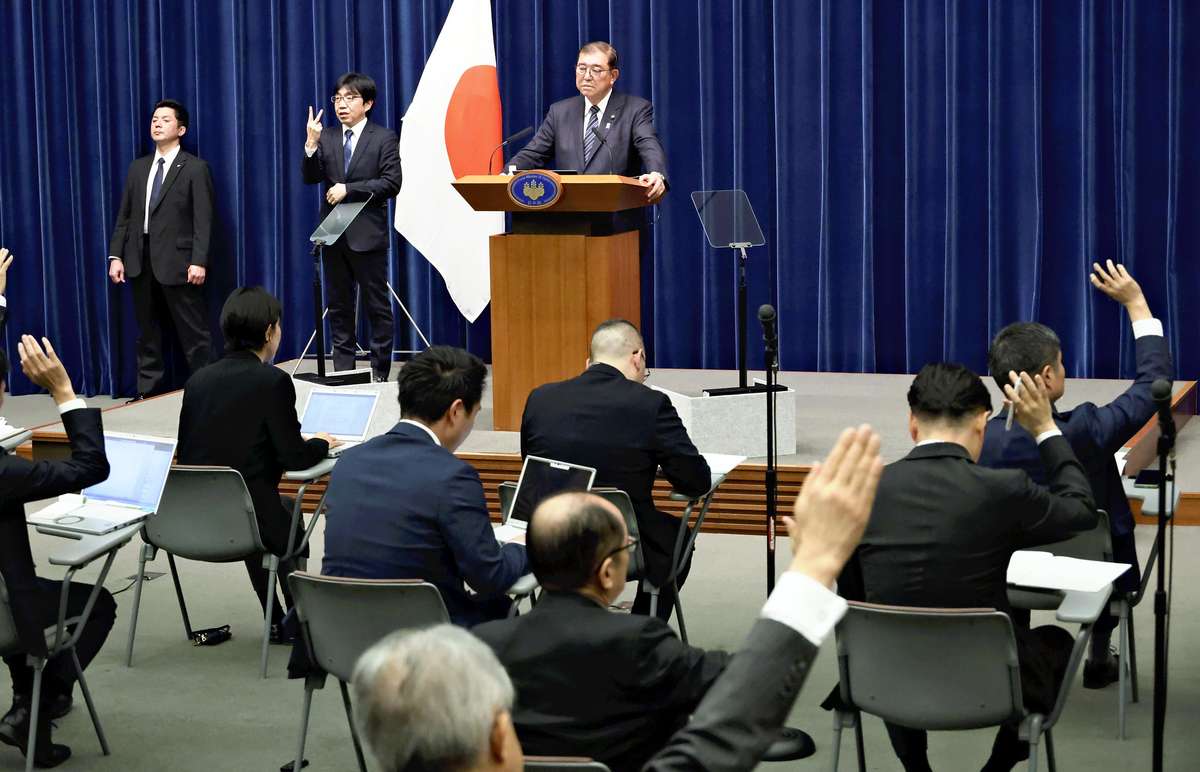Opposition Dictated Pace During Recent Diet Session; Minority Ruling Coalition Makes Concessions, Avoids Big-Picture Issues

Prime Minister Shigeru Ishiba holds a press conference at the Prime Minister’s Office after the extraordinary Diet session came to a close on Tuesday.
16:47 JST, December 25, 2024
With the ruling bloc currently a minority, the opposition dictated the pace of the 216th extraordinary Diet session until it was closed on Tuesday.
The ruling coalition made concessions to the opposition parties to ensure smooth management of the Diet, as the opposition focused on how they could make the ruling parties accept the policies they were advocating. As a result, the Diet failed to deepen debates on big-picture issues such as measures for the declining birthrate and foreign policy strategy.
“I would like to establish the direction for Japan we should aim for while making the most of the advantages of a ‘hung parliament,’” Prime Minister Shigeru Ishiba said at a press conference on Tuesday.
A hung parliament is one where no party has a majority.
The prime minister is apparently confident about his way of managing the government through taking advantage of the ruling bloc’s minority status and gaining the opposition parties’ cooperation.
In the extraordinary Diet session, the ruling bloc was able to pass three bills related to political reform with the approval of most opposition parties. It also obtained the approval of the Japan Innovation Party and the Democratic Party for the People to pass the supplementary budget bill.
“I think we were able to create a method of Diet management suitable for a minority ruling coalition,” an official close to the prime minister said.
In order to win support from opposition parties for the supplementary budget, the Liberal Democratic Party promised to review the “¥1.03 million barrier,” the annual income threshold above which income tax is levied, advocated by the DPFP, and to hold discussions on the realization of free high school tuition proposed by the JIP.
They also accepted the request of the Constitutional Democratic Party of Japan, which opposed the supplementary budget bill, to add ¥100 billion to the budget for the restoration and reconstruction of the quake-stricken Noto Peninsula in Ishikawa Prefecture.
These results did not come about by the opposition parties uniting to press the ruling parties. Rather, they are the result of the LDP calling on each party individually to hold talks. A senior government official said, “The Diet session lacked discussions on issues that may cause pain to the people, such as the financial resources [needed to implement these measures], or those connected to the increasingly severe security environment in East Asia.”
At a party meeting on Tuesday, Yoshihiko Noda, president of the CDPJ, said, “We would like to strategically take on bigger issues in next year’s ordinary Diet session.” Noda is believed to have a ban on corporate and group donations in mind as well as issues like a selective dual surname system for married couples.
The ruling and opposition parties are likely to intensify their tug-of-war ahead of next summer’s House of Councilors’ election.
Top Articles in Politics
-

Japan PM Takaichi’s Cabinet Resigns en Masse
-

Sanae Takaichi Elected Prime Minister of Japan; Keeps All Cabinet Appointees from Previous Term
-

Japan’s Govt to Submit Road Map for Growth Strategy in March, PM Takaichi to Announce in Upcoming Policy Speech
-

LDP Wins Historic Landslide Victory
-

LDP Wins Landslide Victory, Secures Single-party Majority; Ruling Coalition with JIP Poised to Secure Over 300 seats (UPDATE 1)
JN ACCESS RANKING
-

Producer Behind Pop Group XG Arrested for Cocaine Possession
-

Japan PM Takaichi’s Cabinet Resigns en Masse
-

Japan Institute to Use Domestic Commercial Optical Lattice Clock to Set Japan Standard Time
-

Man Infected with Measles Reportedly Dined at Restaurant in Tokyo Station
-

Israeli Ambassador to Japan Speaks about Japan’s Role in the Reconstruction of Gaza























